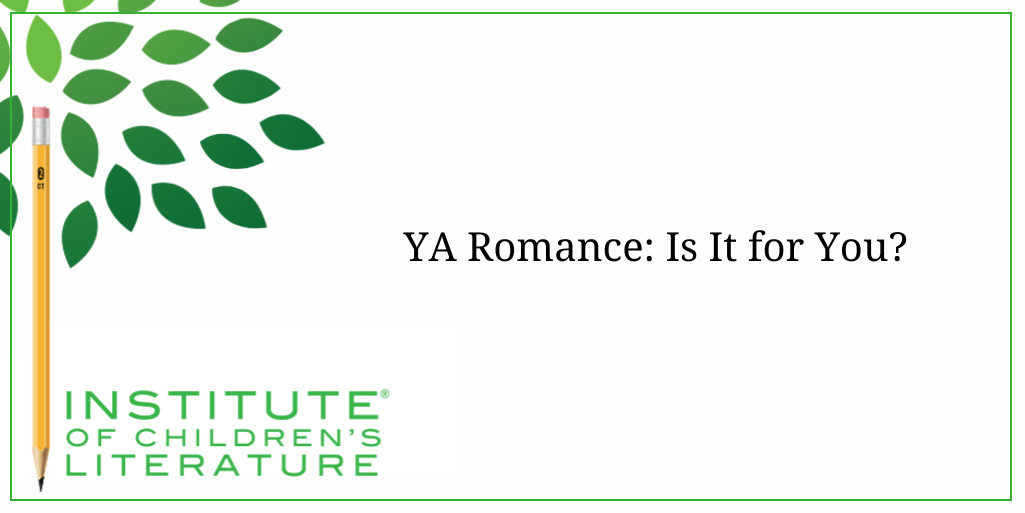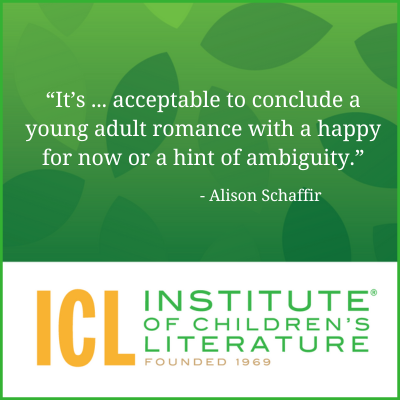
5 Ways Writers Can Prep for 2025 Goal Setting
Before we roll on to the new writing year, let’s harness our optimism for the blank slate before us and prepare for our 2025 Goal Setting just for writers.

Romance writing is one of those things writers and nonwriters love to scorn as somehow easier or less impressive. Meanwhile, romance writers quietly rake in the money. According to Romance Writers of America, readers spend 1.3 billion dollars a year on book-length romance. With that kind of money and the importance of romantic elements to so many books for teen readers, it’s worthwhile to think about YA romance in a less scornful light.

Within the larger scope of all Romance novels, the Young Adult Romance is considered its own subgenre. In YA Romance, the romance is the main point of the novel, but though books that are purely Romance for teens exist, they aren’t the only times you see the meeting of teen readers and romance plots. Romance tends to leak into most YA novels, including those that would not be considered Romance novels at all. This happens because the defining feature of YA novels (coming of age) so often includes relationships both romantic and platonic.
Other than the core element of a romantic relationship that grows and changes, so many of the things we associate with Romance novels, including the happily ever after, aren’t always included in YA novels. It can be difficult to know exactly what to do with the romance part of a non-romance story. In other words, what tips can writers of YA romance benefit from?
Teens are very critical of inauthentic stories. Romantic elements need to feel real, as does all the emotional baggage of the characters. Teens need to relate to the emotions and actions on the page. Awkward is relatable—YA is all about discovery. Awkwardness is usually part of that. One important part of any lasting relationship is shared history, and the awkward moments become a fond memory as that history builds. Don’t feel like your characters need to be smooth. Adults aren’t smooth in beginning relationships, so why would teens manage it?
 2. More than their hormones: Believable attraction.
2. More than their hormones: Believable attraction. Publishing insider, Mary Kole says, “Hot is fine for an instant connection…But then the relationship has to evolve into something with a bit more substance.” In real life, relationships must move from spark to emotional depth or they fail, and this needs to be true of novel romance as well. If all they have between them is “hot,” then it’s not a relationship with depth and believability. Emotional depth is an important part of a good YA romance.
Some of the most beloved romantic stories have a thread of humor and teens love lighter moments even in a complex and emotionally difficult book. Even a book as ultimately heart-wrenching as John Green’s The Fault in Our Stars is also funny. The characters aren’t above saying surprising, snarky, funny things and that is a big part of why we love them, and why they love each other. But humor really only works when it isn’t forced. As romance author Jayne Ann Krentz wrote for Writer’s Digest: “The humorous dialogue or amusing situation should evolve naturally from the plot and the characters. If you find yourself trying to force the humor in a scene, that’s a bad omen.”
The problems in any romantic development should be based on the characters being reasonably bright. If the whole situation could be resolved by one conversation, you’re taking the easy way, and you’ll frustrate readers looking for something with more depth. You do want complications, but they should grow out of the choices and reasonable mistakes the characters make. If a character is keeping a secret that would change everything, that person needs a completely believable motivation to keep the secret. It’s hard to admire and enjoy characters who miss the obvious answer or make ridiculously foolish choices, so keep believability in mind as well as the enjoyment of the reader.

It demands as much from a writer as any other sort of book. In fact, in many ways, it may demand more as writers must be able to reconnect with an emotionally tumultuous time in their lives and do it with honesty and courage if they are going to create a good YA romantic storyline. Even if your characters are two teens on a spaceship, or a werewolf in love with a siren, the emotion itself needs to tap into emotions that are believable, emotions we will all find familiar. YA writing is respectful of teens. So, if you are even slightly scornful of teen romance, then this may not be for you.
If you decide YA romance is something you want to consider, keep in mind that it is popular and it doesn’t have to be soppy or simplistic. In fact, the book will be better and last longer in the marketplace if the characters, situations, and the romance are complex, believable, and compelling. Don’t shy away from romance because it’s too easy. Instead, consider whether you’re up to the challenge of revisiting that time in your own life and bringing it to the page. If you are, this may be just the spot for you.
If you’re a Romance writer, check out our Contemporary Romance First Pages contest on our Writing Contest page!
With over 100 books in publication, Jan Fields writes both chapter books for children and mystery novels for adults. She’s also known for a variety of experiences teaching writing, from one session SCBWI events to lengthier Highlights Foundation workshops to these blog posts for the Institute of Children’s Literature. As a former ICL instructor, Jan enjoys equipping writers for success in whatever way she can.

Before we roll on to the new writing year, let’s harness our optimism for the blank slate before us and prepare for our 2025 Goal Setting just for writers.

Writers can be thin-skinned when it comes to getting feedback on their work. Let’s look at 4 ways to positively deal with constructive criticism!

Rejection is part of the territory when it comes to being a writer. Today we offer reflection for writers to help redirect your efforts after a rejection.
1000 N. West Street #1200, Wilmington, DE 19801
© 2024 Direct Learning Systems, Inc. All rights reserved.
1000 N. West Street #1200, Wilmington, DE 19801
© 2024 Direct Learning Systems, Inc. All rights reserved.
1000 N. West Street #1200, Wilmington, DE 19801
© 2024 Direct Learning Systems, Inc. All rights reserved.
1000 N. West Street #1200, Wilmington, DE 19801
© 2025 Direct Learning Systems, Inc. All rights reserved.
1000 N. West Street #1200, Wilmington, DE 19801
©2025 Direct Learning Systems, Inc. All rights reserved. Privacy Policy.